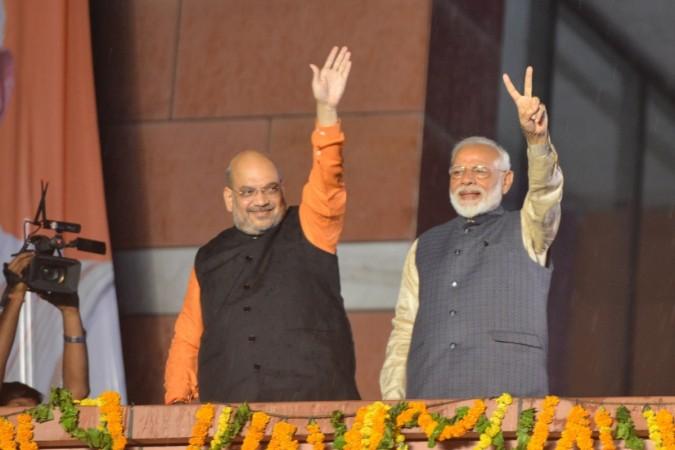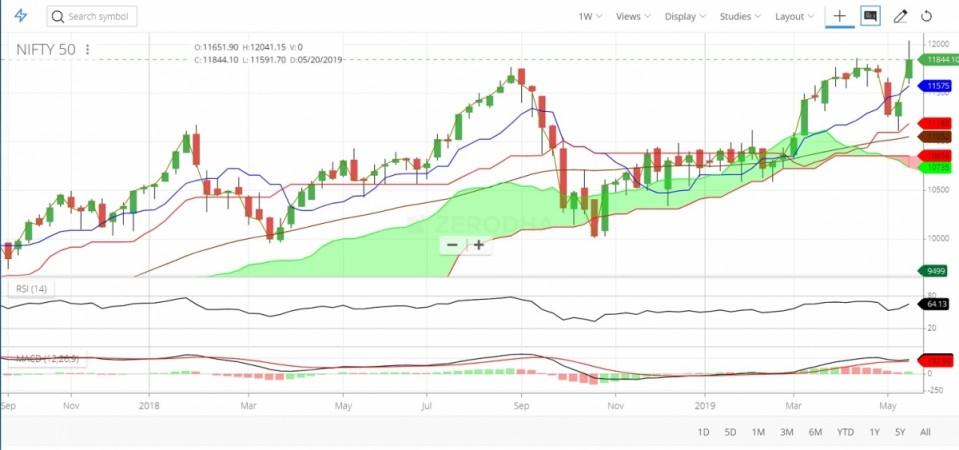
The market may pause until the policy direction of Narendra Modi 2.0 becomes clear after the breathtaking rally during the run-up to the Lok Sabha 2019 election results saw the benchmark indices set new all-time highs. As expected the 30-share Bombay Stock Exchange (BSE) benchmark Sensex scaled the psychological 40,000-point level to touch an all-time high of 40,124 points. The National Stock Exchange's (NSE) 50-scrip headline index Nifty also set an all-time high of 12,041 points. Sensex closed the week at 39,434 points and Nifty at 11,844.
The marked decline in the volatility index India VIX on Friday by 15 percent to 16.46 after opening at 19.40 showed that traders believed the market was close to finding the direction. The rise in Nifty futures (June) premium to about 55 percent also showed the returning confidence of the investors. The Nifty Jun FUT closed the week at 11,902. The Indian currency also gained on Friday, closing 0.6 percent higher against the dollar.
The market will closely watch the Reserve Bank of India (RBI) policy guidance in June after the scheduled swearing-in ceremony and the Union Budget, likely in July, apart from global factors like oil, the direction of the US-China trade war and developments in the Middle East where tensions are brewing between Iran and US-backed Saudi Arabia, experts say.
The market continued to ride the euphoria that the exit polls generated after the last round of the seven-phase polling on May 19 predicting that Prime Minister Narendra Modi's Bharatiya Janata Party (BJP) that heads the ruling coalition of the National Democratic Alliance (NDA) would cross the 272-mark needed for absolute majority in the 542-member Lok Sabha, or the lower house of Parliament.
The results on the counting day on May 23 were closer to the most optimistic predictions with the BJP ending up at 303 seats and the NDA getting 353 seats. The significance of the BJP's performance under party president Amit Shah, who is also expected to join the government, is that the absolute majority will help it to take hard decisions that could spur the economy, unfettered by pressure from coalition partners.

The major opposition grouping of United Progressive Alliance (UPA) headed by Rahul Gandhi-led Congress party managed only 90 seats with the Congress losing out on the position of Leader of Opposition as it fell two seats short of the 54 required to stake a claim. The market would expect the government to act expeditiously to reform the economy because the BJP's absolute majority and the absence of credible opposition would curb the government's need to exhibit a populist zeal, at least in the initial years.
The week could see the market trade sideways awaiting the eventual return of foreign institutional investors (FII) into the market. After four months of net inflow of capital, the market saw massive net outflow in May. Once the government is in place and the policy direction and pace firmly set, the FIIs could return, making June another month of net inflow of FII funds, traders believe.
"This landslide victory has raised hopes that the government would take decisive actions to boost business sentiment and that in turn will support the market growth," a report in MoneyControl quoted Jayant Manglik of Religare Broking as saying. "We feel this feelgood factor could extend next week too, provided feeble global cues do not spoil the party."








